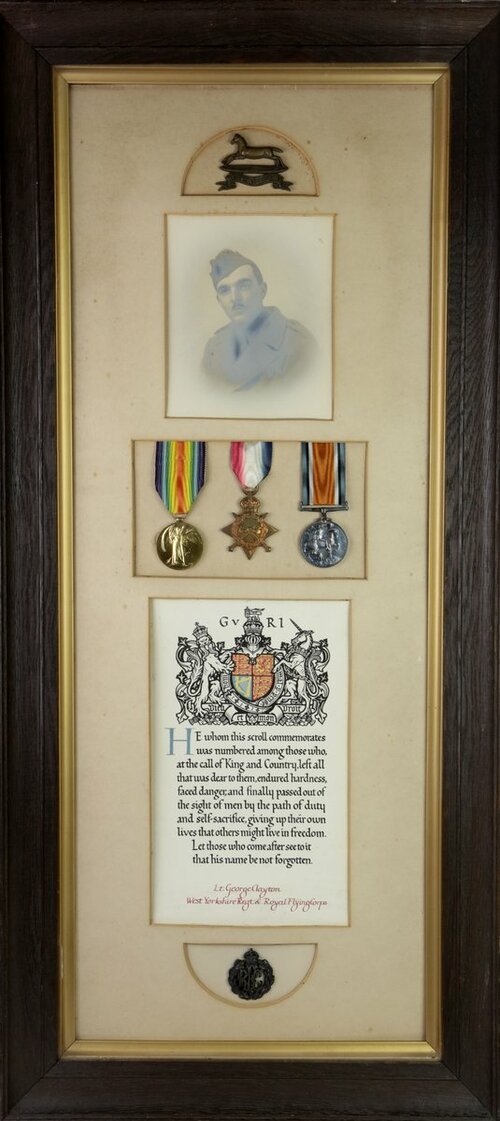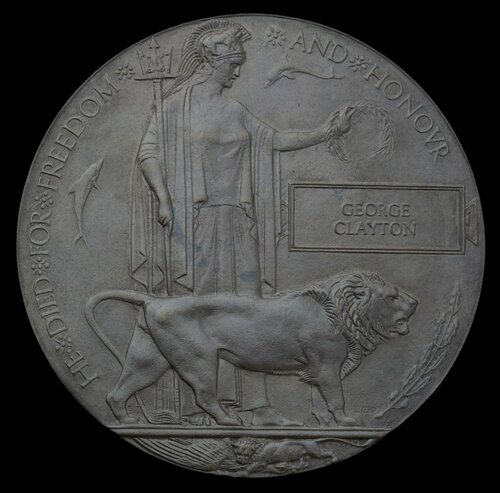Auction: 22001 - Orders, Decorations and Medals
Lot: 226
Dear Sir.,
Having seen in your Circular No. 21. the name of 2nd Lieut. George Clayton. West Yorkshire Regt, attached to Royal Flying Corps, missing Oct. 17th 1916. I enclose some particulars which I have received from an extract from a German Officer's letter on the chance of its being some help in tracing this missing officer.
But you will notice that the initials are not the same, one being G. and the other being W. but in all other particulars I regret to say it seems to answer the description.
I have however written to the German Officer asking him if he thinks there can have been some mistake about the initials.
yours truly.,
Princess Evelyn Blucher
Schloss Krieblowitz
Four: Lieutenant G. Clayton, Royal Flying Corps, late West Yorkshire Regiment, who was killed in action on 17 October 1916 in an ambush by 20 aircraft from Jastas 2 & 5 and was buried with full honours, including an escort Squadron of the Kaiser's own Prussian Garde Lancers, in a ceremony described in a letter by Princess Blucher
1914-15 Star (currently framed under glass, presumably named in this fashion - 2nd Lieut. G. Clayton. W. Yorks. R.); British War and Victory Medals (Lieut. G. Clayton.); Great War Bronze Memorial Plaque (George Clayton), framed under glass in an attractive case with his named memorial scroll, Plaque separate, good very fine (4)
George Clayton was born in 1893, the son of Herbert and Florence Clayton of 70 Oakleigh Road, Clayton, Bradford. An old boy of the Grange School he was later employed by Frankel and Henderson Wool Merchants, Bradford. Entering the war in France on 1 December 1915 with 1st Battalion, West Yorkshire Regiment (Prince of Wales's Own) he was attached to 11th Squadron, Royal Flying Corps 8 September 1916. Clayton's was a baptism of fire with his first trip being on 8 September and his first action on 14 September while escorting a bombing raid at Bapaume. After a busy month with a total of 9 combats he was clearly well use to being engaged however nothing could prepare him for what was to come. He was flying as an observer in a reconnaissance patrol with Lieutenant W. P. Bowman when a force of 20 German aircraft from two Jastas ambushed them. Completely outnumbered they were soon overwhelmed and killed in the resulting engagement.
Tragically after his death it was believed likely that Clayton had survived as the aircraft was seen to go down under control and articles were posted in the newspapers to that effect. The Queen Victoria Jubilee Fund Association, a Swiss based organisation dedicated to discovering the fates of missing soldiers, posted an advert regarding him in their newsletter. This caught the eye of the Princess Evelyn Blucher, an English noblewomen who had married a Prussian aristocrat before the war. She wrote at once to the fund describing a letter from a Prussian Officer which went as follows:
'When we went to see the shot down aeroplane we found only a wreck.
One of the unfortunate cassengers [SIC] was a Lieutenant W. Clayton, first West Yorkshire Regt., the other hero had no sign of identification. One of the Officers had still a Military service book about him in which was a photo of a nice looking woman.
The Squadron of the Lancers had been charged with the burial of the bodies. Two coffins had been quickly made to put the bodies in.
The burial took place at 6 o'clock p.m. the service was beautiful, all the officers of the Squadron were present, also all the officers of this place.
The ceremony began with the hymn "Jesus my God, my Lord" sung beautifully by 50 Lancers. Then came the sermon with the text; "who knows how near my end is".
I thought of the poor relations of the heros [SIC], who had no idea what was happening in this small village-church in France, so far away from them - that the Kaiser"s Garde Lancers were laying their beloved ones to rest with all military honours, appreciating fully their faithfulness to their country unto death.
After the speech was finished, the two coffins were carried to the churchyard by under officers of the Garde Lancers, The band played quite softly; How silently they rest.
We formed a path while Rittmeister - followed the coffins. After having reached the graves, the Lancers saluted with their carbines and we with our sword, till the coffins had disappeared. Then the blessing was said and the ceremony was over.'
Clayton is buried at the H.A.C. Cemetery, Écoust-St.-Mein, Pas-de-Calais; sold together with a copied Marriage Certificate for the recipient's sister as well as an archive of original documents and objects comprising:
i) A letter from Princess Blucher to the Queen Victoria Jubilee Fund Association.
ii) A letter from the Queen Victoria Jubilee Fund Association to the family of Lieutenant Clayton.
iii) A letter from an Officer of the Prussian Garde Lancers to Princess Blucher.
vi) A map of the Fourth Army Front.
v) An Army Book belonging to Lieutenant Clayton, recording his flying history.
vi) Two photographs of Clayton in uniform.
vii) Several photographs of a women.
viii) A named leather map case.
ix) Newspaper cutting relating to his death.
Subject to 20% VAT on Buyer’s Premium. For more information please view Terms and Conditions for Buyers.
Sold for
£1,700
Starting price
£1500







